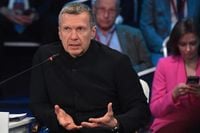In a week marked by escalating rhetoric and rising tensions, the United States and European Union are considering a new wave of crippling sanctions against Russia, while Moscow’s media allies respond with chilling nuclear threats. The standoff, rooted in Russia’s ongoing invasion of Ukraine that began in February 2022, has once again exposed the fragile fault lines dividing East and West—and the world is watching with bated breath.
According to Newsweek and the Mirror, the latest escalation began when US Treasury Secretary Scott Bessent appeared on NBC News' Meet the Press this week. Bessent signaled that the US and EU could "partner" on even stricter sanctions designed to "collapse" the Russian economy. "We are prepared to increase pressure on Russia. But we need our European partners to follow us," Bessent said. "Because if the U.S. and the EU do this together, we are in a race now between can the, how long can the Ukrainian military hold up versus how long can the Russian economy hold up?"
Bessent went further, outlining the potential impact of coordinated Western action: "And if the U.S. and the EU can come in, do more sanctions, secondary tariffs on the countries that buy Russian oil, the Russian economy will be in full collapse. And that will bring President Putin to the table." His remarks, blunt and direct, set off alarm bells in Moscow and across the region.
Within hours, Vladimir Solovyov, a prominent presenter on Russian state television and a close ally of President Vladimir Putin, fired back with a dire warning. According to Julia Davis, a journalist who regularly translates and shares clips from Russian media, Solovyov declared on-air, "He says, it's a question of what will collapse first, the Russian economy, after all sanctions are imposed, or the Ukrainian Army. For some reason, he thinks that if all possible sanctions are imposed against us, we will sit down at the negotiating table. We'll just strike with our nuclear weapons, and that's it. We'll carry out a strike, and that's it."
Solovyov, whose comments have often mirrored the Kremlin’s hardest lines, didn’t stop there. He insisted that Europe was "getting ready for a war" against Russia and that Moscow should "fight harshly and terribly." Such rhetoric, while not new, has taken on a sharper edge as the war in Ukraine grinds on and Western leaders debate new measures to isolate Russia economically and diplomatically.
The nuclear threat comes against the backdrop of real-world provocations. In early September 2025, Poland’s Prime Minister Donald Tusk confirmed that 19 Russian drones had breached Polish airspace during an overnight strike on Western Ukraine. The incursion, reported by both Newsweek and the Express, prompted Poland to formally invoke NATO’s Article 4, which calls for urgent consultations among member states when a nation’s territorial integrity or security is threatened. The move underscores the growing anxiety among NATO countries about the possibility of the conflict spilling over Ukraine’s borders.
The United Nations, too, has sounded the alarm. UN spokesperson Stephane Dujarric stated that the drone incident "again underlines the regional impact and real risk of expansion of this devastating conflict." For many in Europe, the fear is no longer theoretical. With the world’s largest nuclear arsenal at Russia’s disposal, even the threat of a strike is enough to send shivers through diplomatic circles.
As Western leaders weigh their next steps, the debate over sanctions has taken center stage. US Energy Secretary Chris Wright told The Financial Times this week, "If the Europeans drew a line and said: 'We're not going to buy more Russian gas, we're not going to buy Russian oil,' would that have a positive influence on the U.S. leaning in more aggressively [on sanctions] as well? Absolutely." The message is clear: unity between Washington and Brussels is seen as essential if the West hopes to tip the balance in Ukraine’s favor.
Some in Congress are pushing for even tougher measures. Senator Lindsey Graham, a Republican from South Carolina, took to social media to urge President Biden to act swiftly. "Mr. President, Congress is with you. We stand ready to pass legislation authorizing bone-crushing new sanctions and tariffs that can be deployed at your discretion. Our goal is to empower you as you deal with this mounting threat." Graham’s comments reflect a bipartisan sentiment in Washington that Russia must pay a steep price for its aggression, even as some worry about the risk of escalation.
Despite the mounting pressure, the Kremlin remains unmoved. Spokesperson Dmitry Peskov told Reuters this week, "No sanctions will be able to force the Russian Federation to change the consistent position that our president has repeatedly spoken about." The message from Moscow is one of defiance: Russia will not be coerced, no matter the cost.
Meanwhile, the people of Ukraine continue to bear the brunt of the violence. The war, now stretching into its fourth year, has devastated cities, displaced millions, and left thousands dead. While Western leaders debate sanctions and strategy, the reality on the ground remains grim, with no immediate end in sight.
For many observers, the current standoff feels eerily reminiscent of earlier Cold War crises, when nuclear brinkmanship and proxy wars threatened to plunge the world into chaos. The difference now, as analysts point out, is the unpredictable nature of modern warfare—where drones can cross borders in the dead of night, and threats are broadcast instantly to millions on television and social media.
Yet, amid the saber-rattling and diplomatic maneuvering, some still hope for a negotiated settlement. As Bessent and others have suggested, the ultimate goal of sanctions is not to punish the Russian people but to force President Putin to the negotiating table. Whether that strategy will succeed—or whether it will provoke further escalation—remains to be seen.
For now, the world waits. The stakes could hardly be higher, and the choices made in Washington, Brussels, and Moscow in the coming weeks may determine not just the fate of Ukraine, but the future of European security itself.

